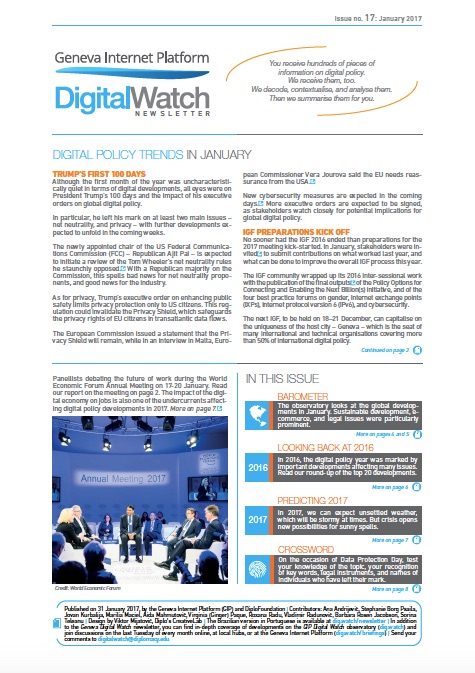
DiploNews – Issue 317 – 1 February 2017
2017 Geneva Engage Awards

[Webinar] Standardisation: The key to unlocking the sustainable development goals
Did you know that voluntary standards can be a key resource in making progress towards the sustainable development goals (SDGs)? In our special webinar, Ms Lorenza Jachia, Secretary of the UN Economic Commission for Europe (ECE) Working Party on Regulatory Cooperation and Standardization Policies – will explain how standards are developed and how they support the achievement of the SDGs. The webinar will take place on Thursday, 9th February, from 13:00 to 14:00 CET (12:00 – 13:00 UTC). Learn more and register to participate.
[WebDebate] Science diplomacy: approaches and skills for diplomats and scientists to work together effectively
Our February WebDebate, on Tuesday, 7th February, at 12:00 UTC (13:00 CET), focuses on science diplomacy. While not a new topic, we are at a critical juncture at which it is important to thoroughly analyse how science, technology, and international relations can work together effectively through diplomatic processes. Our speakers will discuss approaches and skills for effective diplomatic engagement between science, technology, and international relations. Dr Carolin Kaltofen, a member of the Department of Science, Technology, Engineering, and Public Policy at University College London, will draw on her research on science diplomacy, which examines the diverse interactions between modern sciences and global governance. Dr Maurizio Bona, a former advisor to CERN’s Director General, will draw on his career as an applied physicist and engineer, during which he played a key role in developing the superconducting magnets of the Large Hadron Collider, as well his career as an advisor on policy and international relations. Register for the WebDebate.
Upcoming courses
February 2017 online diplomacy courses
Start the new year with one of our most popular online courses:
- Diplomatic Theory and Practice
- Public Diplomacy
- Introduction to Internet Governance
Apply by 2 February 2017 for Diplo certificate courses. For further information or to apply, click on the titles of the courses listed, or visit our courses webpage. Late applications will be considered as long as places remain in the course.
Sign up for our courses mailing list to stay informed about upcoming courses.
Malta scholarships
Thanks to support from the government of Malta, partial scholarships are available for applicants from developing countries to attend upcoming Diplo online courses. These scholarships cover 50-70% of course fees and can be applied to most online courses in 2017. Browse our course catalogue and contact us at admissions@diplomacy.edu for further information.
Executive briefing on digital policy for Geneva-based Ambassadors
Unsettled weather, stormy at times, with sunny spells was the underlying message delivered by Diplo director and GIP head Dr Jovan Kurbalija during an executive briefing for the Geneva diplomatic community last week. The briefing was attended by representatives of 45 member states and 9 international organisations. While acknowledging the difficulties ahead of us, Dr Kurbalija focused on a few sunny spells, including the fact that Geneva – host of the 2017 Internet Governance Forum – can help in addressing digital policy in an informed and effective way. Learn more.
Internet governance in January: Geneva Digital Watch newsletter is out!
Published on 31 January 2017, Issue 17 of the Geneva Digital Watch newsletter provides the latest digital policy updates which took place in January. The main highlights include an analysis of the top trends in January, including the impact of US President Trump’s first 100 days on global digital policy; preparations for the 2017 Internet Governance Forum, which will this year be held in Geneva on 18-21 December; updates on the cyber-saga between the USA and Russia; an analysis of the context for digital predictions for 2017; a review of the main developments in 2016, and a look ahead at 2017, as ten main developments top the list of predictions for the coming months; a round-up of the main digital policy updates of the month and the events that took place in International Geneva; and a crossword on privacy and data protection on the occasion of Data Protection Day, celebrated on 28 January.
The monthly briefing on Internet governance, held also on 31 January, explored the trends, updates, and predictions for digital policy, and included updates from regional hubs. Download the IG Barometer and other resources. The next briefing is on 28 February; registrations are open.


